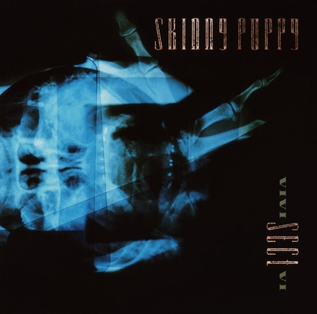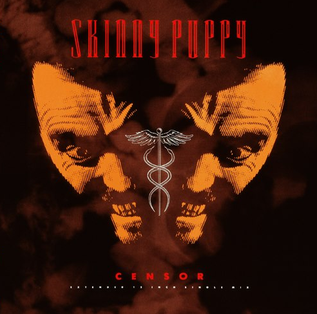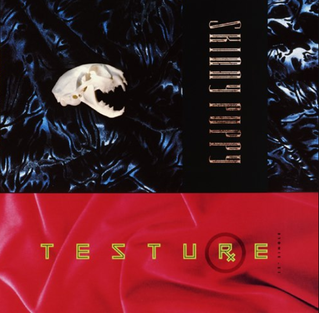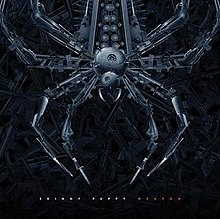
Skinny Puppy was a Canadian electro-industrial band formed in Vancouver in 1982. The group was among the founders of the industrial rock and electro-industrial genres. Initially envisioned as an experimental side-project by cEvin Key while he was in the new wave band Images in Vogue, Skinny Puppy evolved into a full-time project with the addition of vocalist Nivek Ogre. Over the course of 13 studio albums and many live tours, Key and Ogre were the only constant members. Other members have included Dwayne Goettel, Dave "Rave" Ogilvie, Bill Leeb, Mark Walk (2003–2023), and a number of guests, including Al Jourgensen (1989), Danny Carey (2004), and many others.

Kevin Graham Ogilvie, known professionally as Nivek Ogre, is a Canadian musician, performance artist and actor, best known for his work with the industrial music group Skinny Puppy, which he co-founded with cEvin Key. Since 1982, he has served as Skinny Puppy's primary lyricist and vocalist, occasionally providing instrumentation and samples. Ogre's charismatic personality, guttural vocals and use of costumes, props, and fake blood on stage helped widen Skinny Puppy's fanbase and has inspired numerous other musicians.

Dwayne Rudolph Goettel was a Canadian electronic musician, best known for his work in the industrial music group Skinny Puppy. Starting his career playing for a variety of acts around Edmonton, he joined Skinny Puppy in 1986 following the departure of keyboardist Bill Leeb. A classically trained pianist, he helped to broaden Skinny Puppy's sound with his extensive knowledge of equipment and sampling. He assisted bandmate cEvin Key on a number of side projects such as The Tear Garden and Doubting Thomas, and helped form the experimental electronic group Download. He also created the independent record label Subconscious Communications with friend and colleague Phil Western as a means to release his solo work.

Rabies is the fifth studio album by Skinny Puppy. It was released on November 21, 1989 through Nettwerk. The album notably features Ministry frontman Al Jourgensen who performed electric guitar and vocals on several songs. The album spawned two singles, "Tin Omen" and "Worlock", the latter of which becoming one of the band's most recognizable songs. The cover art was made by longtime Skinny Puppy collaborator Steven R. Gilmore. In 1993 the CD edition was reissued by Nettwerk to correct mastering errors in the original release.

Kevin William Crompton, known professionally as cEvin Key, is a Canadian musician, songwriter, producer, and composer. He is best known as a member of the industrial music group Skinny Puppy, which he co-founded in 1982 with singer Nivek Ogre. Initially a side project while he was with the new wave band Images in Vogue, Skinny Puppy quickly became his primary musical outlet after landing a record deal with Nettwerk Records in 1984.

ohGr is a Canadian industrial band formed by Nivek Ogre and Mark Walk of Skinny Puppy. Early ohGr releases incorporated hip hop and synth-pop influences, and in contrast to Skinny Puppy, utilized conventional structures and a lighter tone. Ogre noted that this direction was inspired by the pop bands he enjoyed as a child, such as The Archies. However, in releases such as Devils in my Details, ohGr has taken to a more abrasive, non-linear flavour of electro-industrial, while continuing to release pop albums such as 2018's Tricks.

VIVIsectVI is the fourth studio album by Canadian electro-industrial band Skinny Puppy. It was released on September 12, 1988 through Nettwerk. Despite tackling controversial topics like animal rights, chemical warfare, and environmental waste, VIVIsectVI was well-received. It spawned two singles, "Censor", which was released on the album as "Dogshit", and "Testure", which was Skinny Puppy's only song to chart on Billboard's Dance Club Songs. VIVIsectVI was followed by a theatrically involved tour with Nine Inch Nails as the opening act.

Remission is a 1984 EP by Canadian electro-industrial band Skinny Puppy, their record label debut and first release with Nettwerk. The 12-inch EP originally featured six tracks, then, a year later in 1985, it was released on cassette with five additional songs that lengthened the release to a full album. This expansion became the default version of Remission.

The Greater Wrong of the Right is the ninth studio album by Canadian electro-industrial band Skinny Puppy, released by SPV on May 25, 2004. It is their first full-length record since 1996's The Process. It is also their first album since 1985's Bites without the support of keyboardist Dwayne Goettel, who died in 1995, and their first album since the departure of producer Dave "Rave" Ogilvie. It was produced by Cevin Key and is Ohgr-collaborator Mark Walk's first appearance as an official member of the band. The album's artwork was created by longtime collaborator Steven R. Gilmore.

Too Dark Park is the sixth studio album by the industrial music group Skinny Puppy. The album cover features the debut appearance of the band's "SP" logo. The cover art was created by Vancouver based artist Jim Cummins. The artwork for this album and its associated singles was inspired by cosmic horror stories such as the Cthulhu Mythos. Lyrical themes include collapse of society due to destruction of nature, drug addiction, and psychological issues.

Last Rights is the seventh studio album by Canadian electro-industrial band Skinny Puppy. It was released in March 1992 as the group's final record distributed through Nettwerk. Last Rights saw the band experimenting with two opposite extremes: cacophonous heavy music and gloomy melodies, resulting in moments of industrial weight as well as moments of uncharacteristic softness. Along with containing some of the band's most impenetrable walls of sound and an eleven-minute track composed almost entirely of manipulated and distorted samples, Last Rights also features Skinny Puppy's first ballad.

The Process is the eighth studio album by Canadian industrial band Skinny Puppy. Released by American Recordings on February 27, 1996, The Process was the band's final album before it reformed in 2000 and released The Greater Wrong of the Right in 2004. Skinny Puppy's keyboardist, Dwayne Goettel, died near the end of The Process' recording, and the album experienced difficult production and record-label intrusion.

The Canadian electro-industrial band Skinny Puppy has released twelve studio albums and two extended plays along with a number of live albums, compilations, and singles. The group formed in 1982 and released its debut EP, Back & Forth, in 1984. Later that year, Skinny Puppy was picked up by Nettwerk and released another EP, Remission, in December 1984. The band's first studio album, 1985's Bites, was its last with the original lineup of vocalist Nivek Ogre and producer / multi-instrumentalist cEvin Key; Dwayne Goettel joined in 1986, and the band released its next two albums, Mind: The Perpetual Intercourse and Cleanse Fold and Manipulate, in 1986 and 1987 respectively.

"Censor" is a song by Canadian electro-industrial band Skinny Puppy, taken from its 1988 album VIVIsectVI and released as a single in the same year. "Censor's" original title was "Dogshit", which was changed for this release's marketability.

Worlock is a single by the band Skinny Puppy from the album Rabies. The song uses a sample of the guitars in "Helter Skelter" by The Beatles, as well as a vocal sample of Charles Manson singing the song. Vocalist Nivek Ogre considered it one of the band's better songs.

Chainsaw is a single by the band Skinny Puppy. It contains new material, as well as additional material taken from their albums Bites and Mind: The Perpetual Intercourse.

"Testure" is a song by Canadian electro-industrial band Skinny Puppy, taken from its 1988 album VIVIsectVI and released as a single in 1989. "Testure" was the group's first and last song to chart on Billboards's Dance Club Songs, and it was accompanied with a controversial music video.

Mythmaker is the tenth studio album by Canadian electro-industrial band Skinny Puppy. It was released on January 30, 2007 by Synthetic Symphony. Lead vocalist Nivek Ogre said the band took a simplified approach, but that it was a difficult record to make. It charted on a number of billboard charts, and received mostly positive reviews, with critics focusing on whether it was stylistically similar to previous albums.

"Inquisition" is a song by Canadian electro-industrial band Skinny Puppy. It was released as a single on March 24, 1992 in advance of its host album, Last Rights (1992). The B-side "Lahuman8" was created at the request of the Québécois contemporary dance group La La La Human Steps.






















